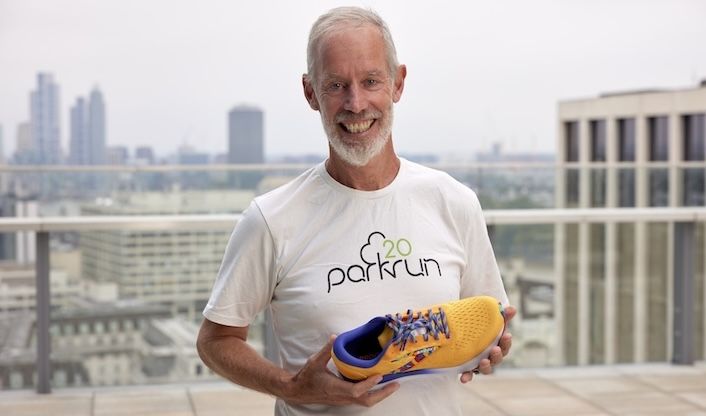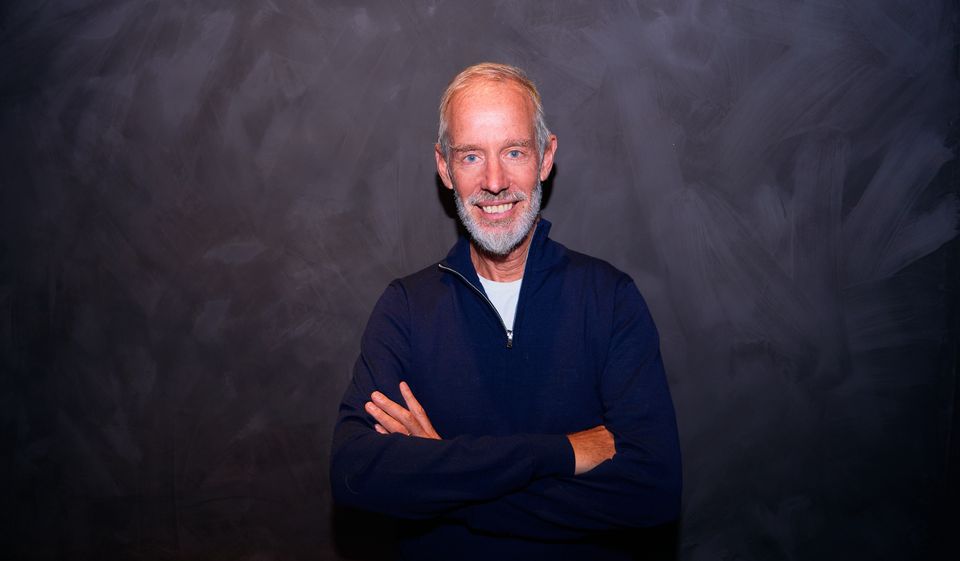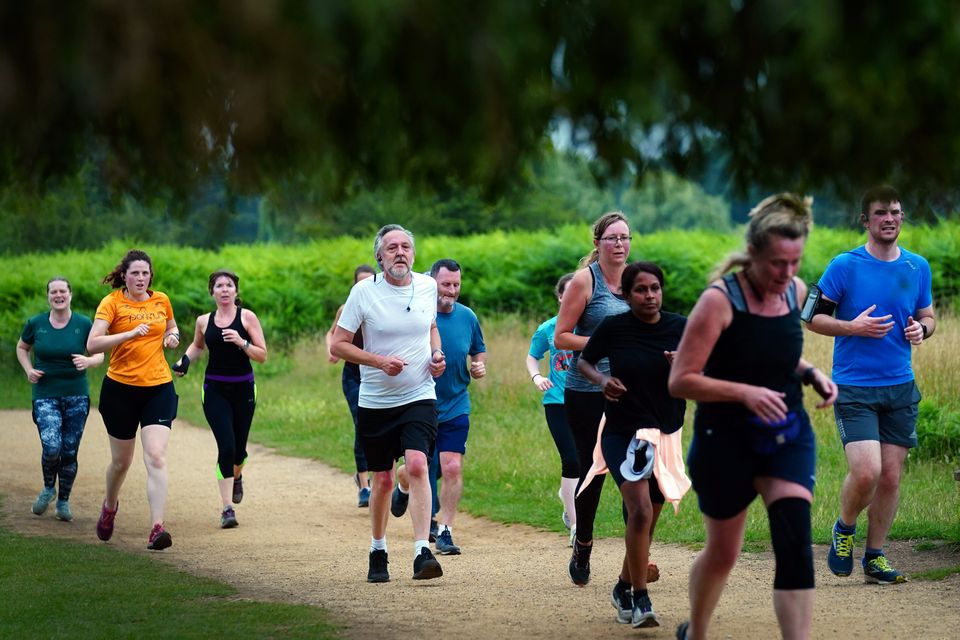People are being encouraged to celebrate parkrun’s 20th anniversary at their local event this Saturday with its founder saying the ethos is about community spirit rather than huge central gatherings.
Paul Sinton-Hewitt was recovering from injury and unable to run when he organised a free timed 5k run at Bushy Park in south-west London, on Saturday October 2, 2004.
Thirteen runners turned up to what was initially called the Bushy Park Time Trial but, when numbers grew each Saturday, other events were launched and, during the past two decades, parkrun has become a global phenomenon which now takes place in 23 countries.
Paul Sinton-Hewitt with the Brooks Ghost 16 parkrun trainers created to celebrate the event’s 20th anniversary (Tom Harrison/PA)
When Bushy Park hosted its 1,000th event in August, more than 6,000 people went along to be part of the celebration and, while the local team still delivered a successful event despite long queues at the finish, Mr Sinton-Hewitt said he does not want there to be similar scenes this weekend.
Mr Sinton-Hewitt, who did not attend the 1,000th event at Bushy Park, told the PA news agency: “I’m concerned about the numbers for the anniversary. Nobody wanted to have that many runners at parkrun. It’s not what we are about.
“The local team did a brilliant job. The people who participated did it in a wonderful way, like a festival. People just had to be kind to each other.
“But I never want to see it again.”
We need your consent to load this Social Media content. We use a number of different Social Media outlets to manage extra content that can set cookies on your device and collect data about your activity.
Mr Sinton-Hewitt said parkrun is about people in the same community gathering together, with numbers “at a reasonable level where you can identify other people in the community, you can identify people like you”.
He added: “Parkrun is a charity. The aim is to make the world happier and healthier.
“In order to make the world healthier and happier we need to bring our events to every single person. We need to find spaces to hold these events.”
The first event was organised as a way to stay connected with running friends when Mr Sinton-Hewitt could not run himself and those community connections continue to be the driving force for the event’s growth.
He was inspired by similar events in South Africa, where he grew up, and where people would run, then get together for coffee.
We need your consent to load this Social Media content. We use a number of different Social Media outlets to manage extra content that can set cookies on your device and collect data about your activity.
He shared leaflets for the first event with his two clubs, Ranelagh Harriers and The Stragglers, and said: “Of the 13 people who pitched up, I knew about eight.
“I didn’t recognise everyone. Of the 13 about eight came for coffee, that was the start of the experience.”
The Saturday morning 5k at Bushy Park grew in popularity, reached 155 participants at its peak and even took place on Christmas Day.
Mr Sinton-Hewitt said he had struggled with his mental health all his life but “started to feel the benefit of this”.
Between 2006 and 2007, runs started in Wimbledon, Richmond, Banstead, Leeds and Brighton while the first international event was held in Zimbabwe.
Paul Sinton-Hewitt was made a CBE in 2014 for services to grassroots sport participation (parkrun/PA)
It continued to grow in the UK and overseas and Mr Sinton-Hewitt said: “I went from ‘let’s grow this running event’ into something that’s more strategic, around mental health, physical health and wellbeing.”
Almost 2,000 GP surgeries around the world are now twinned with a parkrun so they can refer patients for their mental and physical wellbeing.
Parkruns are also held in 25 prisons and young offenders institutions around the world, and have already improved the lives of more than 10,000 people in custody.
Junior parkrun was launched in 2010, a 2k event for for children aged four to 14 and their families which takes place on a Sunday morning in the UK, Ireland and Australia.
Mr Sinton-Hewitt said GP referrals, prisons and junior parkruns are key to attracting people who are not already exercising.
Bushy Park remains one of the most popular parkrun locations (Victoria Jones/PA)
Parkrun, which is held at more than 2,500 locations and remains free to take part, now has more than 10 million people registered worldwide and almost 400,000 of those marked themselves as completely inactive on registration.
Almost six million people have completed a parkrun course at least once, more than 900,000 people have volunteered and, including the junior event, people have crossed a parkrun finish line more than one hundred million times around the world.
People often become regulars and Saturdays simply become “parkrun day”.
“A 100 marathon runner doesn’t need parkrun any more but she will still go to see her friends,” Mr Sinton-Hewitt said.
“We love everybody, the fast, the slow.”
We need your consent to load this Social Media content. We use a number of different Social Media outlets to manage extra content that can set cookies on your device and collect data about your activity.
He said fast runners have lots of other events where they can choose to race but parkrun offers much more than running: “It’s about getting outside, about doing some activity but most importantly it’s about being part of the community.”
Mr Sinton-Hewitt has run about 560 parkruns but, nowadays, arthritis in his left knee means it is “not so much of a run, more of a walk and volunteer,” he said.
He was made a CBE in 2014 for services to grassroots sport participation and people often tell him parkrun has changed their lives but he is modest about his role.
“They are the ones who made this change,” he said.
“What we have done is made it possible to play in the playground. For me that’s enough.”


